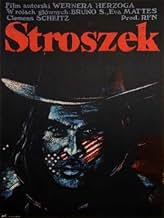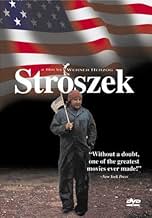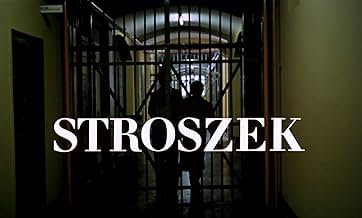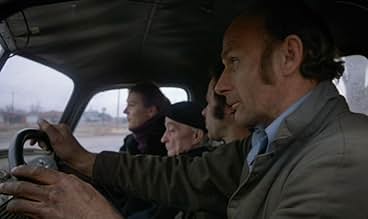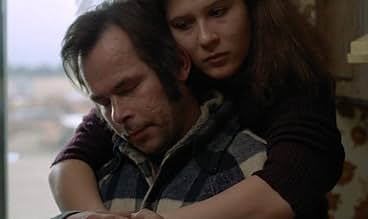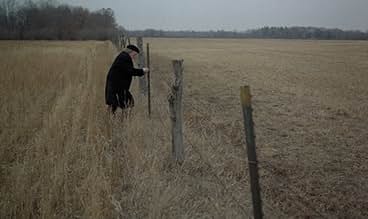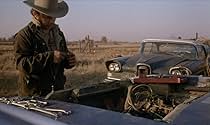Adicionar um enredo no seu idiomaIn Berlin, an alcoholic man, recently released from prison, joins his elderly friend and a prostitute in a determined dream to leave Germany and seek a better life in Wisconsin.In Berlin, an alcoholic man, recently released from prison, joins his elderly friend and a prostitute in a determined dream to leave Germany and seek a better life in Wisconsin.In Berlin, an alcoholic man, recently released from prison, joins his elderly friend and a prostitute in a determined dream to leave Germany and seek a better life in Wisconsin.
- Direção
- Roteirista
- Artistas
- Prêmios
- 2 vitórias e 2 indicações no total
- Scott
- (as Scott Mc Kain)
- Doctor
- (as Dr. Vaclav Vojta)
- Turk prisoner
- (as Yücsel Topcugürler)
- Trucker Pimp
- (não creditado)
Avaliações em destaque
The film handles the story of former asylum inmate Bruno S. (THE ENIGMA OF KASPAR HAUSER) as a Berlin street singer (in a role where he basically plays himself), who joins with his prostitute girlfriend Eva (Eva Mattes) and ageing eccentric friend Scheitz (Clemens Scheitz) to embark on a memorable journey, leaving modern Berlin, for the golden opportunities of America. The 'promised land' is represented by the dreary, austere town of Railroad Flats in rural Wisconsin, where they settle in a mobile home bought on credit, but it turns out America is not gonna fulfill their dreams that easily.
Shot in winter, Berlin is shown as a cold, forbidden and lacklustre place. Not a ray of sunshine. The dark facades of the battered apartment blocks, downlit bars filled with smoke and shabby characters, the only goal the folks in Bruno's world seem to have, is merely make the best of things.
Often read as a critique of how capitalist American society destroys the individual, Herzog sees the film as less a critique of the United States than as "a eulogy" in the wake of the American dream, for such shattered hopes could develop in virtually any country (see "Herzog on Herzog", p. 144). He does throw in some of the eccentricities of American life, but above all, it's a somewhat surreal account of three simple folks, short-changed in life, desperately trying to make ends meet. From the start it's clear that these three are made for each other. They simply do not fit in any stratum of society really. They're too fragile for the world of pimps and low lives that formed the background of their lives in Berlin. Although not dumb, Bruno is too half-witted to be taken seriously by most people. Eva's background is not fully explained, but she's emotionally fragile and dependent, while elderly Scheitz's chances to get ahead in life seems to lay in the past.
It's a bleak and uncompromising film, this tragicomic account of this odd trio in pursuit of a better life outside the dreary confinements of Berlin's lower casts of society, but it's so intensely moving and honest with its subjects, that alone is something to admire.
Camera Obscura --- 9/10
A powerful, deeply moving film, 'Stroszek' is unique and unforgettable. It is a tender portrait of life on the margins of society that is most affecting. Herzog's characters are profoundly realistic creations and his story is full of poignancy. A movie about shattered dreams and dashed hopes, its themes are universal and its images captivating. At times, the precisely honed film feels improvisational or off-the-cuff; which is a credit to the unaffected nature of Herzog's writing and direction. Though there is a lot of humor in 'Stroszek,' it is ultimately a harrowing drama that speaks volumes about the human condition within our callous world.
'Stroszek' reunites Herzog with cinematographer Thomas Mauch, one of his more frequent collaborators. Mauch's naturalistic approach gives the film a documentary-like feel, which bolsters the faux-authenticity of Herzog's narrative. His juxtaposition of the constricting alleyways and streets of Berlin with the wide-open spaces of Wisconsin is arresting and effective. In the role of cinematographer, Herzog regularly uses Mauch, Jörg Schmidt-Reitwein or Peter Zeitlinger. The work of the latter two generally feature more stylizations and elaborate lighting, and possess a dream like atmosphere. For a human-centered drama like 'Stroszek,' the realism of Mauch's approach is most appropriate, as the haunting beauty of the resulting visuals prove.
The film boasts an atmospheric soundtrack, featuring songs by the likes of Sonny Terry and Chet Atkins. David Lynch has often stated that a successful film is comprised of "sound and image moving together through time," positing that, in scenes, visuals and sounds must complement each other; as they do masterfully throughout 'Stroszek'. Terry's 'Old Lost John' is utilized particularly well in one scene at the end of the film that sticks in the mind long after the credits have rolled (as it evidently did in Herzog's; he would re-use the song decades later to similar effect in 'Bad Lieutenant: Port of Call New Orleans').
Herzog has said that he doesn't like to "confront" his films alone during the editing stage, and until 1984, Beate Mainka-Jellinghaus assisted him during that process on all his cinematic endeavors. Their work for 'Stroszek' is flawless, and the film has a steady pace that never lets up. Additionally, the set design is muted, though highly detailed. Locations look long lived in, and the grittiness of their appearance adds to the overall narrative impact.
'Stroszek' stars Bruno S as the titular character. Partially inspired by himself, Bruno gives a tour-de-force performance of boundless depth, vulnerability and emotional perspicuity. He is someone you warm to immediately, and has your sympathies throughout. As does Eva Mattes- the only real professional actor involved- co-starring as Eva the prostitute. Her ease of performance and range leaves an indelible impression on the viewer, and you feel she really cares for Bruno. Also worthy of note is Clemens Scheitz's terrific turn as the elderly, comic Herr Scheitz and a troupe of performing chickens; who do most memorable work (despite the intense stupidity of their gaze).
A masterful and understated tragicomedy, 'Stroszek' is vintage Herzog. Boasting an insightful screenplay full of humor and drama in equal measure, the story is heartfelt and speaks of universal human truths. Seamlessly edited and shot with a distinct visual style, the film is timeless and terrific. Strongly acted and featuring an emotive soundtrack full of catchy tunes, this tale of broken dreams is one you'll find hard to forget.
The running commentary that Herzog has recorded for the recent DVDs of his films are among the most interesting and engaging I've heard, and they're one of the reasons I especially appreciate the DVD medium. That's not to say that he lets the literal-minded viewer off the hook by providing handy explanations for every peculiar image or bit of dialog. When asked what a certain image or phrase signifies, he will sometimes simply say that he cannot explain it. But I find it fascinating to watch a scene, and then scan back and listen to his comments about the location, actors, technical details, and yes, even sometimes the intended effect of a puzzling image. Many of the people seen in his films are non-actors, people he simply ran into, found interesting, and intuitively knew would be effective on film. Some of the players in Herzog's films are the very people that most directors would chase from their set with security guards, but he sees something interesting in them, and finds a way to tap into it. I can't help liking the man for that. Some people have suggested that his use of the unfortunate Bruno S. as a film actor amounted to some sort of exploitation. But it seems to me that his befriending of Bruno, and his artful and patient use of him as a film actor, must have given Bruno some sense of the dignity and worth as a unique human being that was denied him for most of his life. If this means nothing to you, and you don't know anything about Bruno S., the commentary tracks on either "Stroszek" or "The Enigma of Kaspar Hauser" explain his background nicely. It's a remarkable story.
If you're unfamiliar with Herzog's work, he has done some especially exotic films with the volatile actor Klaus Kinski. "Cobra Verde" is a particular favorite of mine. But his films do not have the relentless pace or hyperactive editing typical of mainstream American films. They are unforgiving of those with short attention-spans, so be forewarned.
The scene with the premature baby and the doctor is one of the greatest I've ever seen. It is just amazing, the character of that tiny infant, and shows Stroszek the fundamental power that he lacks, the tenacious nature of humanity to hold onto not only fellow human beings, but also to life itself.
The coin-operated live animals in the end represent not only cruelty and lack of compassion, but the obsessiveness of the American pursuit of entertainment. I personally felt more compassion for these creatures as victims of a system than I did for Bruno, who was pretty much doomed before he came to America.
"Stroszek" tells the fictional story of a real man named Bruno Stroszek. In other words, Stroszek plays himself in this eccentric film about a man who's released from prison, meets back up with his girlfriend and elderly buddy, and takes off for the fabled lands of....Wisconsin....to pursue the American dream. Anyone who's actually been to Wisconsin can probably guess how things play out for three immigrants with about three dollars between them. What follows is a series of vignettes that place Bruno in increasingly desperate straits and ends in an ambiguous finale that involves a ski lift and dancing chickens.
Welcome to the world of Werner Herzog, folks. "Stroszek" is not as compelling as some of Herzog's best, but it does inspire a sort of morbid fascination, if only because we take comfort that our situation isn't as bad as the one our characters find themselves in. But lest you are tempted to feel too sorry for Stroszek, he, like many of Herzog's protagonists, staunchly refuses to beg for sympathy, and faces one hardship after another with the dogged determination of a man who never fully understands how humble is his lot.
Grade: A-
Você sabia?
- CuriosidadesThe entire crew disliked the last sequence so much that director Werner Herzog had to shoot it by himself. Incidentally, he considers this scene the best he has filmed.
- Erros de gravaçãoAfter Bruno, Eva and Scheitz buy a used car, they drive out to Wisconsin. The camera's shadow is visible on the car as Eva drives.
- Citações
[last lines]
Deputy Sheriff: We have a 10-80 out here, a truck on fire, we have a man on the lift. We are unable to find the switch to turn the lift off, can't stop the dancing chickens. Send an electrician, we're standing by.
- ConexõesFeatured in Century of Cinema: Die Nacht der Regisseure (1995)
- Trilhas sonorasOn the Way Down to Phoenix
Written and Performed by Chet Atkins
Principais escolhas
- How long is Stroszek?Fornecido pela Alexa
Detalhes
- Data de lançamento
- País de origem
- Idiomas
- Também conhecido como
- La balada de Bruno S
- Locações de filme
- Plainfield, Wisconsin, EUA(hold up on North Street)
- Empresas de produção
- Consulte mais créditos da empresa na IMDbPro
Bilheteria
- Faturamento bruto mundial
- US$ 3.451
Contribua para esta página


